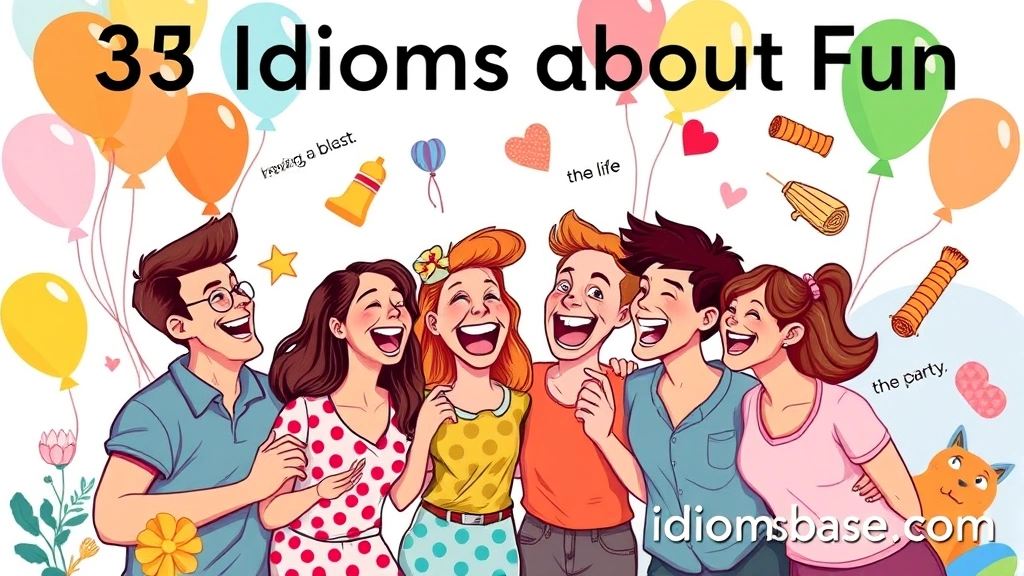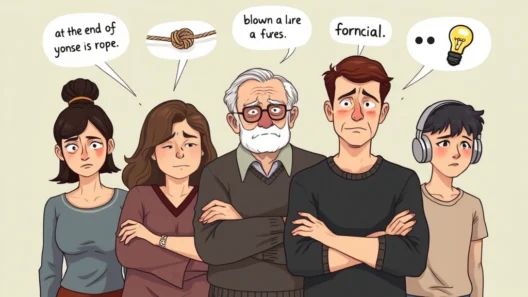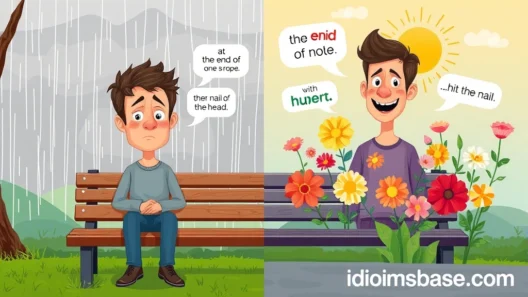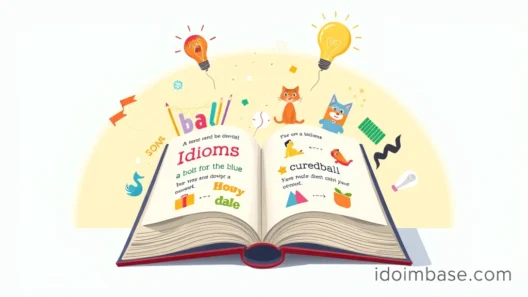Hey there, fun-seeker! Ever found yourself in a situation where you just can't quite describe the sheer joy you're experiencing? Or maybe you're trying to inject a little more zest into your conversations and writing? Well, you've come to the right place! English is bursting with colorful idioms that perfectly capture the essence of having a good time. They're like little linguistic fireworks, adding sparkle and personality to your speech.
Learning these idioms isn't just about sounding more fluent; it's about understanding the nuances of English culture and connecting with people on a deeper level. Plus, they’re incredibly fun to use! So, get ready to dive into a treasure trove of expressions that will help you talk all about fun, laughter, and good times. Let's explore 35 fantastic idioms that will make your English truly sing!
35 Idioms About Fun
Get ready to expand your vocabulary and express yourself with flair! Here are 35 amazing idioms about fun, categorized for your learning pleasure.
Idioms About Having a Great Time
These idioms describe situations where you're enjoying yourself immensely.
- Have a blast: To have a very enjoyable time.
- Example: "We went to the concert last night and had a blast!"
- Have a whale of a time: To have a very exciting and enjoyable experience.
- Example: "The kids had a whale of a time at the amusement park."
- Be in high spirits: To be very cheerful and happy.
- Example: "After winning the game, the team was in high spirits."
- Paint the town red: To go out and enjoy oneself boisterously, often by visiting many bars or clubs.
- Example: "It's my birthday, let's go out and paint the town red!"
- Let your hair down: To relax and enjoy yourself freely.
- Example: "It's a party, so just let your hair down and have fun!"
- Live it up: To enjoy oneself in a lively, extravagant way.
- Example: "They won the lottery and decided to live it up for a while."
- Have a ball: To have a very good time. (Similar to "have a blast")
- Example: "Everyone at the wedding was having a ball on the dance floor."
- Kick up your heels: To relax and enjoy yourself, often by dancing or celebrating.
- Example: "After all that hard work, it's time to kick up your heels."
- Make merry: To celebrate and enjoy oneself.
- Example: "The whole village gathered to make merry during the festival."
- Whoop it up: To celebrate noisily and enthusiastically.
- Example: "They were whooping it up after their team scored the winning goal."
- Have a field day: To have an opportunity to do something enjoyable, especially something mischievous.
- Example: "The journalists had a field day with the celebrity scandal."
- Be the life of the party: To be the most lively and entertaining person at a social gathering.
- Example: "With his jokes and stories, John is always the life of the party."
Idioms About Enjoying Simple Pleasures
These idioms focus on finding joy in everyday things or less extravagant activities.
- Enjoy oneself: To get pleasure from something. (A straightforward but essential one!)
- Example: "I hope you enjoy yourself at the picnic."
- Have a good time: To experience pleasure or enjoyment.
- Example: "Did you have a good time at the beach?"
- Lighten up: To become less serious and more relaxed.
- Example: "Oh, come on, lighten up! It's just a game."
- Take pleasure in (something): To enjoy something.
- Example: "She takes great pleasure in gardening."
- Get a kick out of (something): To enjoy something very much; to find something amusing or exciting.
- Example: "I really get a kick out of watching old comedy films."
- Have a laugh: To enjoy oneself by laughing, often at something silly or amusing.
- Example: "We just sat around, telling stories and having a good laugh."
- Be good for a laugh: To be amusing or entertaining.
- Example: "His silly dance moves are always good for a laugh."
Idioms About Things Being Fun or Entertaining
These idioms describe the quality of something as being enjoyable.

- A barrel of laughs: Something or someone that is very funny or enjoyable.
- Example: "His stand-up routine was a barrel of laughs."
- A bundle of fun: Someone or something that is very enjoyable or entertaining.
- Example: "My little niece is a bundle of fun when she comes to visit."
- All fun and games: Used ironically to suggest that something initially enjoyable can become serious or problematic.
- Example: "It was all fun and games until someone got hurt."
- Good clean fun: Enjoyment that is not morally offensive or dangerous.
- Example: "Playing board games with the family is good clean fun."
- A laugh a minute: Extremely funny or entertaining.
- Example: "That comedy show was a laugh a minute!"
- More fun than a barrel of monkeys: Extremely enjoyable or entertaining.
- Example: "The new video game is more fun than a barrel of monkeys!"
Idioms About Spoiling Fun or Not Having Fun
Sometimes, even fun has its opposite. These idioms cover those moments.
- Rain on someone's parade: To spoil someone's enjoyment or plans.
- Example: "I don't want to rain on your parade, but the park is closed today."
- Take the fun out of (something): To make something less enjoyable.
- Example: "The strict rules really took the fun out of the game."
- Be a wet blanket: A person who discourages enjoyment or enthusiasm.
- Example: "Don't invite him, he's such a wet blanket at parties."
- All work and no play: A proverb suggesting that a lack of leisure time is unhealthy and unfulfilling.
- Example: "Remember, all work and no play makes Jack a dull boy!"
- Not my cup of tea: Something that one does not enjoy or is not interested in.
- Example: "Extreme sports are just not my cup of tea."
Idioms for Playfulness and Mischief
These idioms lean into the playful or slightly mischievous side of fun.

- Play a prank/trick on someone: To do something mischievous to someone for fun.
- Example: "The kids loved playing pranks on their dad."
- In good sport: To be a good loser; to accept defeat gracefully.
- Example: "Even though they lost, they were in good sport and congratulated the winners."
- Just for kicks: For amusement; just for fun.
- Example: "We drove to the next town just for kicks."
- Monkey business: Playful or mischievous behavior.
- Example: "Stop that monkey business and get back to work!"
- Have a playful spirit: To have a lively, fun-loving, and sometimes mischievous nature.
- Example: "Despite her age, she still has a wonderfully playful spirit."
FAQ: Your Questions About Fun Idioms Answered!
Curious to know more about these delightful expressions? Here are some frequently asked questions!
Q1: Why are idioms about fun so common in English?
A1: Idioms are a vital part of any language, reflecting its culture and history. English speakers, like people everywhere, love to have fun and express joy! So, it’s natural that there are many colorful ways to describe enjoyment. They add zest to conversations and make communication more vibrant and less literal.
Q2: How can I remember all these idioms?

A2: Great question! It can seem overwhelming at first, but here are some tips:
- Context is key: Try to use them in sentences that make sense to you.
- Practice regularly: The more you use them, the more natural they'll become.
- Group them: Like we did here, grouping similar idioms can help.
- Visualize: Imagine the idiom's literal meaning (e.g., painting the town red) and connect it to its figurative meaning.
- Listen actively: Pay attention to how native speakers use them in movies, songs, or conversations.
Q3: Are these idioms formal or informal?
A3: Most idioms about fun are considered informal and are perfect for casual conversations with friends, family, or colleagues you know well. Using them in a formal business presentation or academic paper might sound out of place. Always consider your audience and the setting!
Q4: Can I mix and match these idioms?
A4: Absolutely! Once you understand their meanings, you can creatively combine them. For example, "We had a blast and were in high spirits all night!" or "The party was a barrel of laughs, everyone was having a ball." Just make sure they fit the context and don't create a confusing sentence.
Q5: Do other languages have similar idioms about fun?
A5: Yes, every language has its own unique idioms, and many will have expressions for joy and fun, though they might be completely different in their literal translation. For instance, in Spanish, you might say "pasarlo bomba" (to have a bomb time) or in French, "s'amuser comme un fou" (to have fun like a madman). It's fascinating to see how different cultures express similar feelings!
Q6: Are there any idioms about fun that are outdated?
A6: While most of the idioms listed here are still commonly used, language does evolve! Some older expressions might fall out of favor over time. For example, while still understood, "make merry" feels a bit more traditional than "have a blast." Sticking to the more frequently heard ones ensures your English sounds current and natural.
Key Takeaways
You've just explored a fantastic collection of idioms all about fun! Here are the main points to remember:
- Enrich Your English: Using idioms about fun adds color, personality, and fluency to your conversations and writing. They make your English sound more natural and engaging.
- Express Nuance: These idioms allow you to describe different shades of enjoyment, from having an explosive "blast" to simply "taking pleasure in" something quiet.
- Cultural Connection: Idioms are windows into culture. Understanding these expressions helps you connect more deeply with native English speakers and their way of thinking about joy.
- Informal Use: Remember that most fun idioms are best suited for informal settings. They help you connect with people on a friendly, casual level.
- Practice Makes Perfect: Don't be afraid to try using these idioms. The more you incorporate them into your daily language, the more confident and natural you'll become!
So, go forth and have a blast with your newfound vocabulary! Which of these idioms will you try using first? Let us know!





